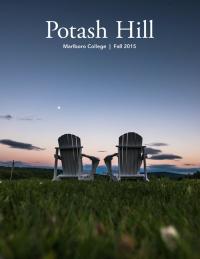“I’m interested in how theater creates dialogue and new understandings,” says Jean O’Hara, who joined Brenda Foley as theater faculty last spring semester. Jean comes to Marlboro with two decades of teaching and directing experience, ten years in higher education, and a wealth of knowledge in areas of high interest to students, including political theater, environmental justice, and gender studies.
“Everything about Marlboro attracted me to Marlboro,” says Jean. “I love the fact that it has a smaller number of students, and that students have the freedom to choose what they want to study and take classes they are interested in—those are the best kind of students. At the same time, faculty can teach what they are passionate about— this is an amazing and rare opportunity as more and more universities are standardizing their curricula. I really love that Marlboro allows that freedom on both ends.”
Jean received her bachelor’s degree from Rhode Island College, her master’s from Humboldt State University, and her PhD from York University, with a dissertation that explores how two-spirit plays challenge the dominant narrative about gender and sexuality. She is also the editor of the anthology Two-Spirit Acts: Indigenous Queer Performances, and says that studying Indigenous societies has radically changed the way she views gender.
“Although I’ve been examining gender and gender politics for a long time, two-spirit scholarship radically shifted my worldview. The colonial tactics of annihilation of gender variance within Native communities was directly linked to the division of communally held land of Native nations. The communal system was replaced by individually owned property passed through the male bloodline. I believe we, both Native and non-Native people, are still living with the effects of this system, which created a binary and hierarchy between all genders.
Jean uses her work to investigate themes of racism, sexism, classism, ableism, transphobia, and heterosexism, and believes in the power and efficacy that theater has to give voice to traditionally marginalized groups. Having worked with both the San Francisco Mime Troupe and Augusto Boal’s Theater of the Oppressed, Jean credits Boal with laying the foundation for her own pedagogy, for seeing students as agents in the classroom. “We need to come from a place of equality in order to freely learn and create, versus working in hierarchical frameworks,” Jean says.
Jean is passionate about using theater as a venue for environmental justice, and for creating and maintaining local food sources. She co-edited and co-directed the play Salmon is Everything, which encouraged unity among farmers, ranchers, fishermen, and Native communities to all work for a cleaner river and healthy salmon runs in California and Oregon’s Klamath Basin.
“Having helped co-create Salmon is Everything, and bringing it out to reservations, really showed me the power of storytelling on another level,” says Jean. “To have non-Native community members and Native people from three different nations all working together to help keep the river healthy for everyone was really powerful. The play actually helped with that coalition— instead of all fighting for water, farmers and ranchers and fishermen and Native people were all looking at the bigger issue, which were the dams that stopped the flow of water. I’m proud that the play helped lead to legislation for those dams to come down.”
Last spring, Jean incorporated the community greenhouse into her class called Eco-Drama: Staging the Environment and Community, which culminated with harvesting their produce and making a meal combined with produce from other local farmers. She’s interested in local food and the slow food movement as a sustainable alternative to the present “megafood industry,” which is harmful to the land, animals, and workers.
This fall semester, Jean is offering two one-credit courses called Theater in the Wilds, which combine theater exercises with an outdoor adventure—a rafting trip and a backpacking trip, respectively. She is also collaborating with Spanish professor Rosario de Swanson to present Teatreras y Directoras, a course about Latin women who make theater and films exploring identity, family, citizenship, and class, among other topics.
“I see theater and storytelling as an important way to connect, build community, and create a much-neededto be heard,” she says. “I’m excited about co-creating with Brenda a really engaging theater program in the next few years. We are thrilled about our connection with the Vermont Performance Lab, and looking forward to incorporating Marlboro College theater more into the community.”
For Marlboro students interested in theater, Jean suggests exploring every aspect of the discipline, from playwriting to design, from acting to directing. “I think it’s really important for every theater artist to read and attend plays to expand how they view and present stories. She also suggests that students take risks in classes and on the stage. “Theater is such a gift of opening up your world and creating deep intimacy—it will change you in ways you never imagined.”

